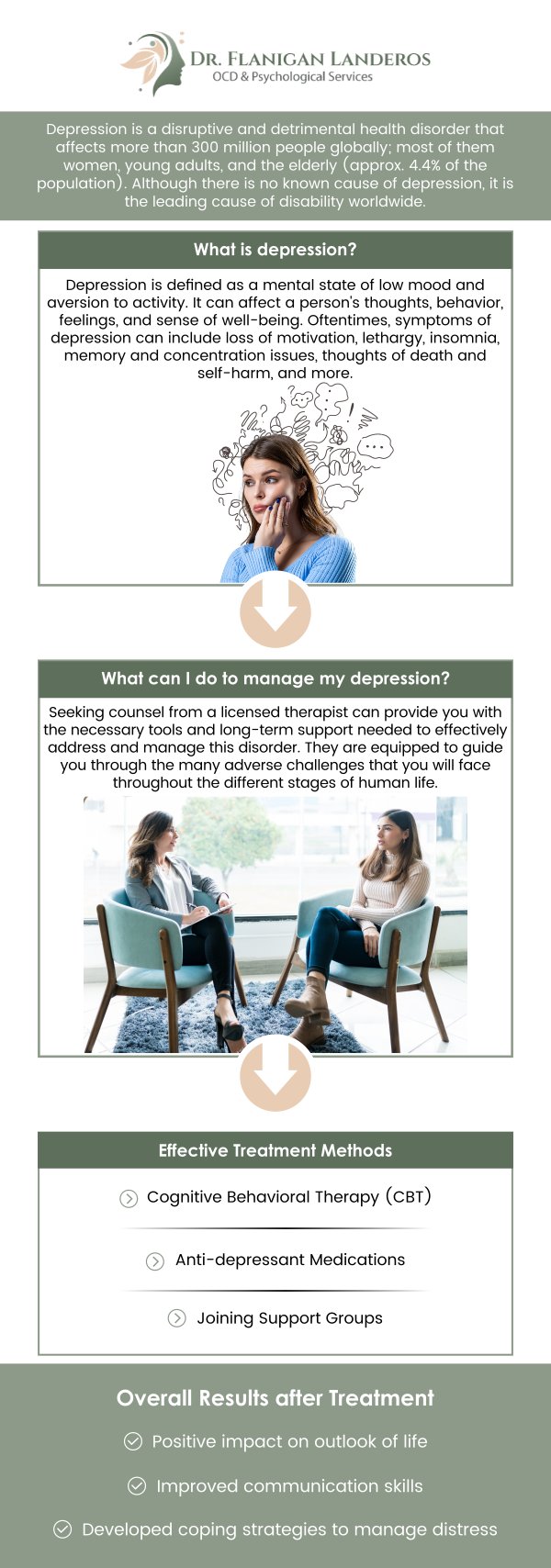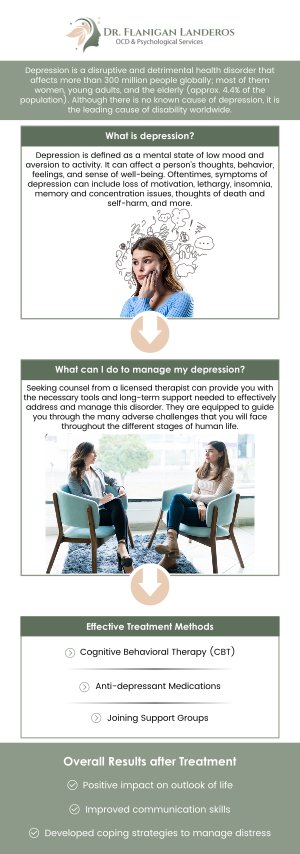Effective Depression Treatment Without Medication Q&A
Effective depression treatment without medication focuses on therapeutic approaches such as Cognitive Behavioral Therapy (CBT), DBT, and lifestyle changes. These methods help individuals address negative thought patterns, improve emotional well-being, and build coping skills. With personalized guidance, therapy can provide long-lasting relief and support for managing depression naturally. Dr. Katie Flanigan-Landeros, a licensed Clinical Psychologist, offers these evidence-based treatments. For more information, contact us or schedule an appointment online. We are conveniently located at 400 Continental Blvd FL 6, Suite A El Segundo, CA 90245.


Table of Contents:
What are the most effective non-medication treatments for depression?
Can therapy alone help treat depression?
How does cognitive behavioral therapy (CBT) work for depression?
How does lifestyle change affect depression symptoms?
How long does it take for non-medication treatments to improve depression?
How does Dr. Katie Flanigan-Landeros help patients manage depression effectively without using medication?
There are several non-medication options that have proven effective for addressing depression, particularly when treatment is tailored to the individual’s unique situation and needs. At Dr. Flanigan Landeros OCD & Psychological Services, therapy is central to care, with approaches like Cognitive Behavioral Therapy (CBT), Acceptance and Commitment Therapy (ACT), and Dialectical Behavior Therapy (DBT) playing key roles. These treatments help patients confront negative thought patterns, improve emotional regulation, and work toward behavior changes that align with their values. Individual psychotherapy, group therapy, and psychological testing are also available to help assess and guide treatment more precisely. In some cases, ERP may be incorporated when depression overlaps with obsessive-compulsive symptoms.
In addition to talk therapy, many individuals benefit from structure and coping tools that target both emotional and practical aspects of life. Lifestyle-focused strategies, such as sleep regulation, movement, and meaningful daily routines, can often complement treatment, especially when depression is connected to life transitions or co-occurring challenges like anxiety or perfectionism.
For many individuals, especially those with mild to moderate depression, therapy alone can be an effective and sustainable treatment. This is especially true when the therapy is focused, individualized, and grounded in a collaborative relationship with the provider. At Dr. Flanigan Landeros OCD & Psychological Services, therapy addresses the underlying patterns that contribute to depression, whether those are cognitive distortions, avoidance behaviors, or stress responses tied to past experiences. Through consistent sessions and targeted interventions, many patients find that therapy leads to improved daily functioning and increased emotional clarity, without the need for medication. Therapy also gives patients the opportunity to work through unresolved issues that may be contributing to depressive symptoms. Grief, trauma, relationship dynamics, and internalized self-criticism are all common areas explored in the process. In some cases, therapy may be paired with lifestyle changes or supported by other mental health services, depending on the complexity of the case.
CBT helps individuals with depression by targeting the way thoughts, behaviors, and emotions interact with one another. Dr. Katie Flanigan Landeros uses CBT to help patients identify the automatic thoughts that often go unchecked but influence mood and energy levels. Once these patterns are identified, therapy focuses on reframing them, introducing more balanced, realistic perspectives that aren’t steeped in self-judgment or hopelessness. Patients are guided toward small, manageable actions that help counter the withdrawal and inertia that often accompany depression. Re-engaging with activities that once felt meaningful, setting short-term goals, and tracking small wins can create a gradual sense of progress. Over time, patients may notice their thought patterns improving and their motivation returning.
Lifestyle changes can make a measurable difference in how depression presents. Sleep quality, nutrition, physical movement, and time spent in restorative or meaningful activities all influence mood and energy regulation. While these changes may not eliminate depression on their own, they can support and accelerate therapeutic progress. At Dr. Flanigan Landeros OCD & Psychological Services, Dr. Katie Flanigan often works with patients to identify gaps in routine or behaviors that may be unintentionally reinforcing depressive patterns. That might include long hours of isolation, erratic sleep, or neglecting the kinds of activities that once brought a sense of purpose. For patients navigating long-term stress or major life changes, therapy combined with lifestyle restructuring can provide both emotional support and a return to rhythm.
The timeline for improvement depends on several factors, including the severity of symptoms, the individual’s level of engagement with therapy, and the presence of any underlying or co-occurring conditions. For some, a few months of structured therapy, especially approaches like CBT, can lead to noticeable changes in mood, thought patterns, and functioning. For others, particularly when symptoms are long-standing or connected to past trauma, the process may be more gradual. Dr. Katie Flanigan Landeros works collaboratively with each patient to develop a treatment pace that honors their readiness and capacity for change. Because non-medication treatments often focus on behavior change, emotional regulation, and insight-building, the benefits tend to compound over time. Progress may not be instant, but with consistency and a supportive therapeutic relationship, many individuals begin to feel better within the first few months. Even subtle shifts can signal that things are moving in the right direction. For many, these improvements continue to build long after therapy has begun, laying a more stable foundation for the future and reducing the chance of recurrence.
Dr. Katie Flanigan-Landeros, a Clinical Psychologist serving Santa Monica El Segundo, CA, helps patients manage depression effectively through evidence-based, non-medication therapies that promote long-term emotional balance and resilience. She begins by identifying each patient’s thought patterns, emotional triggers, and behavioral responses to tailor a plan that encourages lasting change. By fostering self-awareness and helping patients develop healthy coping skills, she supports them in achieving stability and improved daily functioning without the need for medication.
Her therapeutic approach combines several proven modalities, including Cognitive Behavioral Therapy (CBT) to challenge and reframe negative thinking, Dialectical Behavior Therapy (DBT) to enhance emotional regulation and distress tolerance, and Acceptance and Commitment Therapy (ACT) to help patients live in alignment with their values despite difficult emotions.
Depression treatment is available at Dr. Flanigan Landeros OCD & Psychological Services. For more information, contact us or schedule an appointment online. We are conveniently located at 400 Continental Blvd FL 6, Suite A El Segundo, CA 90245. We serve patients from El Segundo CA, Santa Monica CA, Inglewood CA, Gardena CA, Torrance CA, Hawthorne CA, Culver City CA, Westmont CA, West Los Angeles CA and surrounding areas.

Check Out Our 5 Star Reviews


Additional Services You May Need
▸ Anxiety
▸ Depression
▸ OCD
▸ Relationships
▸ Individual Psychotherapy
▸ Psychological Testing
▸ ADHD
▸ Telehealth
▸ Seasonal Mood Changes
▸ Cognitive Behavioral Therapy
▸ Life Transition
▸ Acceptance and Commitment Therapy (ACT)
▸ Exposure With Response Prevention (ERP)
▸ Dialectical Behavior Therapy (DBT)
▸ OCD Subtypes
▸ Perfectionism
▸ Group Therapy

Additional Services You May Need
▸ Anxiety
▸ Depression
▸ OCD
▸ Relationships
▸ Individual Psychotherapy
▸ Psychological Testing
▸ ADHD
▸ Telehealth
▸ Seasonal Mood Changes
▸ Cognitive Behavioral Therapy
▸ Life Transition
▸ Acceptance and Commitment Therapy (ACT)
▸ Exposure With Response Prevention (ERP)
▸ Dialectical Behavior Therapy (DBT)
▸ OCD Subtypes
▸ Perfectionism
▸ Group Therapy


